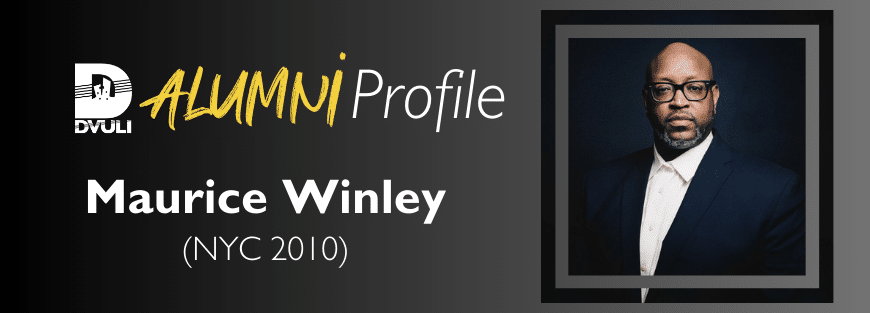Maurice Winley Profile
Posted by: Courtney Lampen | December 13, 2024

By: Ebonie Davis (Washington DC 2021), Contributor
Alumni: Maurice Winley (New York 2010)
Organization: Living Redemption Youth Opportunity Hub, in Harlem, New York
Position: Youth Pastor and Executive Director
Maurice Winley (New York 2010) founded the Living Redemption Youth Opportunity Hub in Harlem, New York, out of his own experience with redemption after facing life in prison. The organization’s mission is “saving lives and healing communities one relationship at a time.” He’s an advocate for justice-impacted youth and families and a collaboration champion. Maurice has served as a DVULI presenter, speaking on the core value of interdependence. ___________________________________________________________
Q1: How long have you been involved in youth programs?
I started as a volunteer, and my first assignment was teaching primary boys in Sunday school. I went through the ranks of the youth ministry at the church, and as a youth pastor, I began to get opportunities to do outreach in the community. My students would invite me to their schools to speak to their peers, which led to connections with principals and, in time, running rites of passage programs in those schools. The Lord kept opening doors as I was tapped to be a part of other initiatives. Eventually, I was invited to be a chaplain and later a director at St. Christoper’s Inc., an adolescent residential treatment facility for special needs teens. That experience helped me understand many of the root causes and family challenges affecting justice-impacted youth. I saw how youth are processed through systems without receiving the individualized care and attention they need. Serving there was a powerful opportunity that really helped me grow. That’s where I first learned how to write proposals to receive funding for our work with youth.
Q2: What challenges has the organization had to overcome?
We were working at the intersection of a system that didn’t have a good relationship with the community. Building a collaboration with the NYPD, the District Attorney’s Office, and the New York City Department of Probation created some tensions; sometimes, we were the lightning rod for those tensions. We had to learn to maintain creditability by staying true to our core and speaking truth to all sides.
Our founding grant proposal included everything we wished for at that time. It was mind-blowing when we were awarded $10.6 million to develop initiatives to prevent youth from entering the criminal justice system! We didn’t even have an organization yet; we were just a project team under a fiscal sponsor. We’d been more focused on the ground game with youth and families, but now we had a government-reimbursable contract. This milestone performance-based grant required us to hit benchmarks to receive funding. We had to learn much about data, business operations, and fiscal operations. Often, it just felt overwhelming.
We had to build an organizational structure and all the things that come along with that. As our staffing needs grew, we had to consider developing a culture. This is heavy work! When you’re dealing with gun violence and entering into the crisis of youth and families, it can take a toll. So, how do we cultivate a culture of self-care, balance, and interdependence? We had to create an ethos that lived out these values.
A mentor once told me that I was going to learn the strength of God. And how do you do that? God’s strength is made perfect in weakness.
Q3: What are you most proud of that the program has accomplished?
We’ve almost tripled our annual budget, so we’re just getting started. I’m proud of the beauty of our workplace culture. As a youth minister, my passion and part of my identity is working directly with the youth, so I had to learn how to empower others. I had to move to the background to give them those opportunities. That shift helped us grow from 12 to 35 staff members. We have multiple sites throughout the city and are known for our integrity, innovation, and impact.
Another highlight is our model of Credible Messengers. Credible Messengers are individuals from the community who embody transformation and healing and have the credibility through their lived experiences to lead youth to transformation. God recently blessed us with a national stage as an anchor partner with the Credible Messenger movement. We’re part of a five-state expansion of the work, aiming to raise 150 credible messengers to do this kind of deep community, transformative work over the next three years.
Q4: What do you think youth leaders need to know about collaboration?
This answer was captured on video. Listen now!

